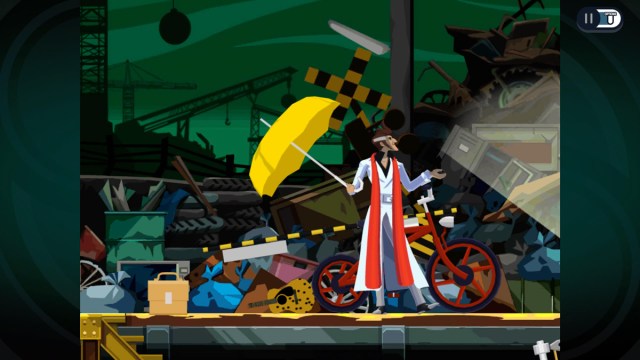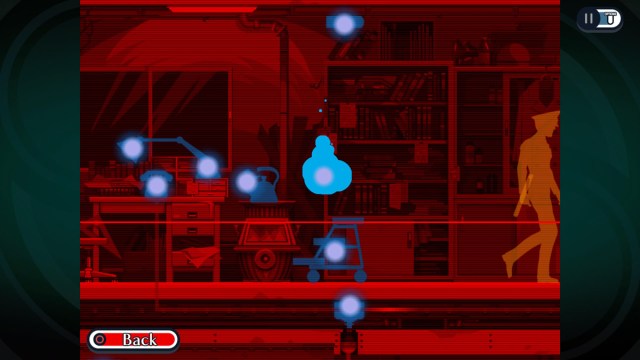Please add Sissel to the next Marvel vs. Capcom
When it comes to Nintendo, you never know if its consoles and handhelds will go out with a bang or with a whimper. The GameCube, for instance, went out with an absolute whimper, as new releases had all but dried up by the time the Wii arrived. Yes, it got Twilight Princess in the end, but it was pretty sparse otherwise. The Nintendo DS, on the other hand, went out with one hell of an explosion. In the months leading up to the release of the 3DS, publishers dropped an assortment of gems for the platform, including Okamiden, Radiant Historia, Dragon Quest VI: Realms of Revelation, and Pokémon Black & White in North America and Europe. And that was just in the first three months of 2011 before the 3DS hit.
This is also when Shu Takumi’s follow-up to the Phoenix Wright series, Ghost Trick: Phantom Detective, arrived stateside. I remember picking this up at launch, captivated by its premise, and gorging myself on the game over a cold January weekend. It’s too bad not many other people did at the time, but considering this game is all about second chances, it’s fitting Sissel, Missile, and the rest of this well-animated crew get a second shot at the limelight with this new HD remaster.

Ghost Trick: Phantom Detective (PC, PS4 [reviewed], Switch, Xbox One)
Developer: Capcom
Publisher: Capcom
Released: June 30, 2023
MSRP: $29.99
Ghost Trick: Phantom Detective is an adventure whodunnit starring a recently deceased man named Sissel. Found dead in a junkyard, face down/ass up, he has just one night to solve the mystery behind his murder before he moves on to the afterlife. His lifeless body is discovered by go-getter freshman detective Lynne, and the two cross paths throughout the night as Sissel has to keep saving her life from the assassins sent to hunt her down. Keeping her alive will take Sissel to various locations around the city, from a chic apartment to a prison to a chicken restaurant. Each location and the people who dwell there play key roles in keeping Lynne alive to sunrise and Sissel on the hunt for the truth of what happened to him.
Because he is dead, Sissel’s only means of protecting Lynne and anyone else who gets in harm’s way is to manipulate objects in the environment. This is just one of his Ghost Powers, and it’s his use of these powers that make up the game’s puzzle-solving side. Each environment is an immaculately hand-drawn 2D setting stuff with objects Sissel can possess and occasionally interact with. Some objects are only there to provide a bridge for Sissel to reach the necessary tools needed to solve the puzzle. Other objects are interactive like an umbrella you can open up or a trash can lid you can pop. Using his Ghost Powers, Sissel can also travel between locations through telephone lines, but only if he isn’t in a flashback.
As I said, there are assassins out and about in the game, hunting down Lynne and whoever has the misfortune to get in their way. Most of the time, when Sissel arrives to save one of the victims, they’re already dead. With his final Ghost Power, Sissel can travel back in time to watch the last four minutes of the character’s life. Every time you travel back in time, you’ll be able to see everything that happens to the victim and decide how to protect them using the various objects in each setting. There is a time limit for getting this all done, but it’s rarely an issue. Even if you do fail, you can just rewind the clock and start again. Don’t be surprised if you have to watch the victim die more than once to fully figure out how to save them.
The premise of these puzzles is sound enough, but seeing it in action can be riveting. You’re basically playing the role of an invisible stagehand trying to manipulate how a scene plays out while the actors are in the middle of it. It’s a clever concept with brilliant execution, though it doesn’t provide any sort of lightbulb-over-the-head aha moments. This isn’t the type of puzzle game where you’ll have a constant stream of epiphanies that make you feel elated. It’s more just being satisfied with figuring out how to get everything into place for the desired set piece.
Outside of the people-saving and puzzle-solving, there is a great deal of lore to lap up in Ghost Trick. Shu Takumi really outdid himself with solid writing and an engaging, eccentric cast. I’m sure the ending will be just as hotly debated as it was back in 2011, but know the journey to that end is brimming with great character moments and charming writing. There are so many memorable faces here, all brought to life with outstanding animation.
The original Ghost Trick was notable for its incredibly fluid character animation, best exhibited by the flamboyant Detective Cabanela. The look was achieved by creating the characters as 3D models before rendering them as 2D sprites. On the DS, it was smooth and crisp even if it was a bit pixelated (which was fine given the size of the Nintendo DS screens). On the PlayStation 4, it’s just as smooth and crisp, but with the power of the RE Engine, the entire look of this game has been cleaned up from top to bottom. This HD remaster gives the world of Ghost Trick a slick glow-up. It’s very polished, to the point where some might argue it’s too polished, but I could never seriously make that argument. I did notice a few very minor visual blemishes when some characters would walk, but outside of those moments, this is a gorgeous game. At least when you’re not in the UI.

Ghost Trick: Phantom Detective’s origins as a Nintendo DS game are impossible to miss. For starters, only some elements, like a few of its new menus, are in widescreen. The game itself is full-screen with borders. I have to imagine this decision was made for the same reason classic fighting games are always presented in 4:3 with borders on the side. Giving players a widescreen video of a full-screen game may break whatever challenge there is. I’m fine with the 4:3 ratio for the gameplay, but there are moments where what originally looked good on the DS is a bit too much on a regular television screen. Some character portraits and speech bubbles are unnecessarily huge.
I understand that, in an age where developers keep releasing games with text sizes that would feel at home at the bottom of a pharmaceutical commercial, I probably shouldn’t be complaining about having an easy-to-read text size. But it doesn’t look great, and neither do some of the menus and other parts of the UI that feel unnecessarily big. It’s a minor complaint on my part, but I can’t help but notice when I see elements of the remaster that lack the slickness of the rest of the package. The game also lacks voice acting, if you’re wondering, but I prefer it that way. I don’t need some professional voice actor coming in here and messing up what Cabanela sounds like in my head.
As for how it plays—which I probably should have discussed earlier in this review—the conversion from touch controls to a traditional controller works well. I do think the control scheme, in terms of what buttons you use, could have been simplified (no reason to stipulate circle will exit the Ghost World when L1 does the same thing and it’s the button you pressed to get into it), but it’s not anything that’ll give you trouble. Because I played on PlayStation, I do not know if the Switch version has a touch control option. In terms of what’s new for the remaster beyond the visual upgrade, Ghost Trick includes challenges, rearranged classic music tracks, one new music track, a collection of artwork and concept art, and the sliding puzzles from the mobile version of the game.
All in all, Ghost Trick: Phantom Detective is a fine remaster of a wonderful title far too many people missed out on. Shu Takumi has stated another entry in this franchise might happen if this game sells well enough, but I feel like that’s a statement we’ve heard dozens of times over the past 10 years with little of anything to show for it. Whether or not we get another game in the series doesn’t really matter to me. What matters is more people now have an opportunity to play an absolute gem of an adventure game.
[This review is based on a retail build of the game provided by the publisher.]






Published: Jun 27, 2023 10:00 am